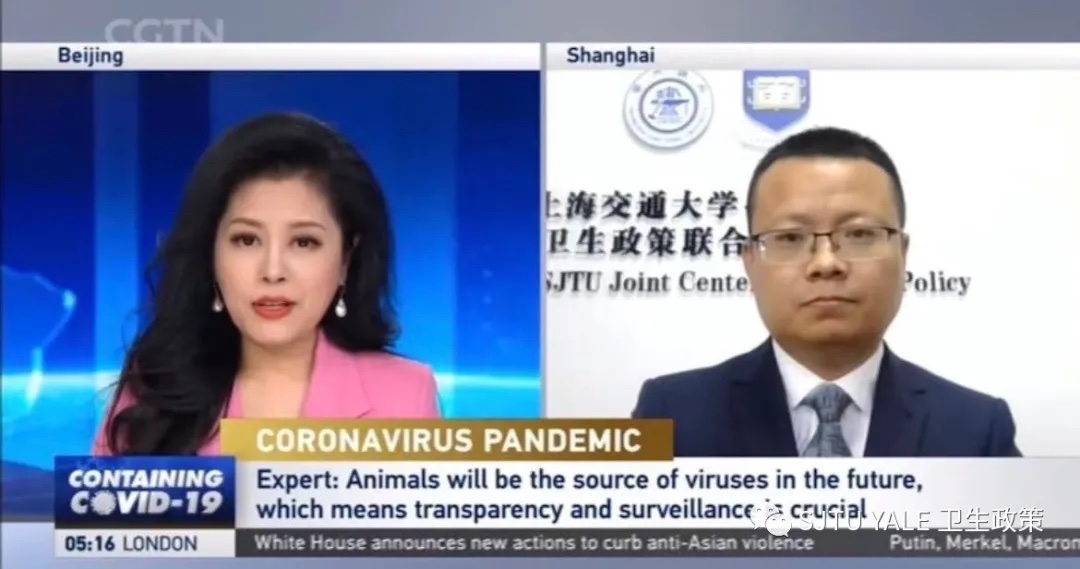上海交大赵大海教授接受央视专访:新冠病毒的溯源完全是一项科学工作

上海交通大学国际与公共事务学院教授、博士生导师,上海交通大学-耶鲁大学卫生政策联合研究中心执行主任赵大海,自新冠肺炎疫情暴发以来,对于新冠疫情暴发、防控以及卫生政策第52次接受中央电视台专访,也是第84次接受央视、上视专访。2021年3月31日,赵大海在中央电视台英语频道的《环球瞭望》节目,就世界卫生组织发布的在中国的新冠病毒溯源报告,以及与该报告的相关话题进行了解释和评论。现将有关访谈内容翻译并摘录如下。
主持人:根据刚才我们对威廉姆斯教授的访谈提示,人类仍然不知道许多传染病的源头,例如艾滋病。是什么使得溯源这些病毒变得困难呢?
赵大海:一般来说,我们用两种方法来追溯传染病病毒的源头。第一是流行病学调查。流行病学调查的目的是追溯传染病的第一个病人,也就是我们通俗讲的“零号病人”。然而,事实上,我们非常难以找到真正的零号病人。因为当病毒最开始传播时,没有人会意识到它的存在;当人们意识到的时候,病毒已经存在很长时间了。第二是研究病毒在动物和环境中的分布。这也是一项艰巨的工作。特别是病毒很容易变异,最初的病毒可能会变异成一种全新的病毒。此外,在开展病毒溯源的时候,病毒源头的一些证据可能已经丢失,甚至可能永远也无法找到。因此,我们对于病毒的溯源必须有一个合理的预期。人类可能永远都不会追溯到一些病毒的源头,艾滋病、新冠肺炎病毒也不例外。
主持人:世卫组织的报告还提出了一种可能性,即在中国境外的新冠肺炎病毒起源比中国境内更早。您认为这种可能性有多大?
赵大海:正如我刚才所介绍的追溯新冠病毒零号病人的困难,当人类发现所谓的第一例新冠病毒病例时,新冠病毒和真正的零号病人肯定已经存在很长时间了。从国外已有的大量前期研究来看,一些国家发现新冠肺炎病毒的时间是要比中国更早。因此,我认为这种可能性是很大的。实际上,新冠肺炎病毒的溯源完全是一个科学问题。所有国家的相关科学家都应该共同努力来追溯新冠肺炎病毒,尽管新冠病毒的溯源是一项艰巨的工作。
主持人:您所说的所有国家的相关科学家应该共同来溯源新冠肺炎病毒,指的是新冠肺炎病毒溯源要在所有国家来开展吗?您觉得这是必须的吗?
赵大海:是的,我确实是这个意思。新冠肺炎病毒的溯源确实需要在所有国家共同开展,各国的相关科学家应全力以赴进行溯源工作。
供稿者:国务学院
日期:2021年4月1日
Dahai ZHAO’s Exclusive Interview with CGTN: The traceability of the virus is entirely a scientific work
Dahai Zhao, a doctoral supervisor at the School of International and Public Affairs of Shanghai Jiao Tong University and Executive Director of Shanghai Jiao Tong University-Yale University Joint Research Center for Health Policy, has been interviewed by CGYN for the 52st time (the 84st time by CGTN / ShanghaiTV) since the COVID-19 pandemic. On March 31, 2021, Zhao commented on the “WHO’s report on virus origins and topics related to the report” on “Global Watch” of CGTN.
Anchor: We just heard that we still don't know the origins of many pandemics, such as HIV-AIDS. What makes it difficult to trace these viruses?
ZHAO: Generally speaking, there are two ways to trace the origin of the virus. First, epidemiological investigation, its objective is to trace the initial source of general infectious diseases, known as Patient Zero. It is so difficult to find the real patient zero, due to the fact when the virus starts, no one notices it; when people find it, the virus has existed for a long time. the other is the investigation of virus distribution in animals and environment. Second, The investigation of virus distribution in animals and environment. It is also a tough job. Particularly, the virus is very easy to be mutated. The initial virus may mutate into a completely new virus. In addition, some evidence of the origin of the virus has been lost and may never be found. Therefore, we have to have a reasonable expectation. Human beings may have never known the origin of some viruses such as COVID-19.
Anchor: The WHO report also raised the possibility, the coronavirus originated earlier, outside of China. How likely do you think that's the case?
ZHAO: Just as what I said aforementioned the difficulty of tracing the patient zero of COVID-19, when human beings found the so-called first case of the COVID-19, the virus and the real patient zero must have existed for a long time. Considering the previous evidences from some other countries, the virus of COVID-19 has been detected much earlier than the findings in China. Therefore, I believe the possibility is very high. Actually, the origin of COVID-19 is a completely scientific issue. Scientists in all countries should work together to try to find the origin of the virus, although the tracing origin is a tough job. The tracing origin of COVID-19 should be conducted in all countries.
Anchor: By working together, do you mean conducting investigations of origin in all countries? Is it necessary?
ZHAO: Yes, absolutely. I believe tracing origin of COVID-19 should be conducted in all countries. All related scientist should work together to fight against the COVID-19 pandemic.
Contributor: SIPA, SJTU
Date: April 1, 2021

